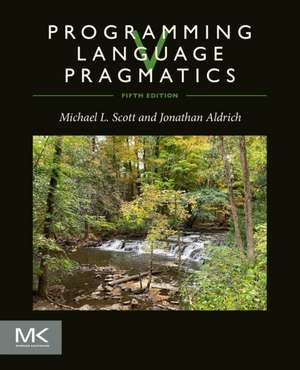Programming Language Pragmatics
Autor Michael Scott, Jonathan Aldrichen Limba Engleză Paperback – 21 apr 2025
- Provides a complete re-write of the chapter on semantic analysis, using formal inference rules
- Includes a heavy revision of the chapter on type systems
- Presents significant updates to the chapters on composite types, object orientation, and code generation
- Covers new material on ownership types, safe concurrency, asynchronous programming, traits, move constructors, template “concepts,” the LLVM compiler infrastructure, and many other topics
Preț: 444.64 lei
Preț vechi: 669.50 lei
-34% Nou
Puncte Express: 667
Preț estimativ în valută:
85.09€ • 92.40$ • 71.48£
85.09€ • 92.40$ • 71.48£
Carte nepublicată încă
Doresc să fiu notificat când acest titlu va fi disponibil:
Se trimite...
Preluare comenzi: 021 569.72.76
Specificații
ISBN-13: 9780323999663
ISBN-10: 0323999662
Pagini: 992
Dimensiuni: 191 x 235 mm
Ediția:5
Editura: ELSEVIER SCIENCE
ISBN-10: 0323999662
Pagini: 992
Dimensiuni: 191 x 235 mm
Ediția:5
Editura: ELSEVIER SCIENCE
Cuprins
I. Foundations
1. Introduction
2. Programming Language Syntax
3. Names, Scopes, Bindings
4. Semantic Analysis
5. Target Machine Architecture
II. Core Issues in Language Design
6. Control Flow
7. Data Types
8. Composite Types
9. Subroutines and Control Abstraction
10. Data Abstraction and Object Orientation
III. Alternative Programming Models
11. Functional Languages
12. Logic Languages
13. Concurrency
14. Scripting Languages
IV. A Closer Look at Implementation
15. Building a Runnable Program
16. Run-time Program Management
17. Code Improvement
1. Introduction
2. Programming Language Syntax
3. Names, Scopes, Bindings
4. Semantic Analysis
5. Target Machine Architecture
II. Core Issues in Language Design
6. Control Flow
7. Data Types
8. Composite Types
9. Subroutines and Control Abstraction
10. Data Abstraction and Object Orientation
III. Alternative Programming Models
11. Functional Languages
12. Logic Languages
13. Concurrency
14. Scripting Languages
IV. A Closer Look at Implementation
15. Building a Runnable Program
16. Run-time Program Management
17. Code Improvement
